|
|
|
Sort Order |
|
|
|
Items / Page
|
|
|
|
|
|
|
| Srl | Item |
| 1 |
ID:
130235


|
|
|
|
|
| Publication |
2014.
|
| Summary/Abstract |
Within the context of intelligence, the assassination of Egypt's President Muhammad Anwar al-Sadat on 6 October 1981 can be characterized as both a symbolic security failure and a failure to implement professional security principles by those responsible for guarding his life.
The circumstances creating the security "hole" were not confined to the short period preceding the assassination, but rather began long before, as part of an intense clash between two conflicting forces: extreme Islam and modern statehood.
In contrast to prevailing opinion, the apex of the struggle between these two forces is the main reason for the assassination, and not Sadat's peace with Israel. 1 The assassins of the al-Jihad group, springing unchecked from the substratum of fundamentalist Islam, carried out their work resolutely, exploiting the circumstances with almost incredible ease.
The sixth of October, observed in Egypt as a day of military triumph over the Israel Defense Forces (IDF) in the October 1973 War (the Yom Kippur War), is celebrated as an official holiday at the Grave of the Unknown Soldier on the outskirts of Cairo. On that date in 1981, on the reviewing stand stood President Sadat and his entourage: Vice President Hosni Mubarak; Defense Minister Mohammad Abu-Gazala; members of parliament; and members of the diplomatic corps, among them Israeli Ambassador Moshe Sassón.
Mirage fighter planes flew in celebratory formation above, and all in attendance were occupied with watching them and the huge parade passing before the reviewing stand, as columns of soldiers marched past the proud president.
When it was the artillery unit's turn to pass, a military truck stopped suddenly, from which four uniformed men sprang. Thinking this was part of the pageantry, no security personnel acted to prevent them from approaching the reviewing stand. One of the men quickly threw a grenade that did not explode, followed by more grenades. The assassins cocked their weapons and charged, firing at those on the reviewing stand.
The speed and suddenness with which the assassination was carried out resulted in pandemonium. People ran in all directions to take cover while Sadat stood, stiff and in shock, making him a clear target for sniper Hussein Abbas, 2 who shot him in the neck and chest. Sadat collapsed on the spot, yet this did not prevent another assassin, Abed al-Hamid, from emptying the rest of his rifle's magazine unhindered to confirm the kill. Sadat was flown by Gazelle helicopter to the Armed Forces Military Hospital at Ma'adi, but he arrived with no pulse, as his chest and arteries had been fatally penetrated.
The individual responsible for the assassination was Captain Khalid al-Islambouli. The fact that he and his partners managed to carry out this "inside job," despite explicit warnings having been received of threats on the president's life at the parade, testifies to a complete absence of common sense on the part of the Egyptian security sector.
The head of the Israeli security unit and lead investigator of the assassination, who was also responsible for Ambassador Sasson's rescue, was Avraham Rotem. According to Rotem, some members of Sadat's security detail were known to Rotem's unit personally due to previous reciprocal visits between Israeli and Egyptian personnel. 3 For this reason, the part played by Egyptian security personnel that day remains a mystery, due precisely to Israel's familiarity with them and the fact that they had acquired their security expertise from the best American instructional training. Sadat's assassination therefore raises a number of burning questions emanating from the fact that many in the upper Egyptian echelons knew that Sadat was in the opposition's crosshairs.
|
|
|
|
|
|
|
|
|
|
|
|
|
|
|
|
| 2 |
ID:
131665
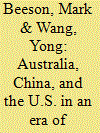

|
|
|
|
|
| Publication |
2014.
|
| Summary/Abstract |
Tensions in the Asia-Pacific region are rising as a consequence of the U.S. "pivot" to Asia and China's increasingly assertive foreign policy. Other states in the region must try to reconcile potentially conflicting economic and strategic imperatives as a consequence. Australia illustrates these dilemmas. We ask what role regional institutions can play.
|
|
|
|
|
|
|
|
|
|
|
|
|
|
|
|
| 3 |
ID:
132892
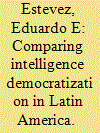

|
|
|
|
|
| Publication |
2014.
|
| Summary/Abstract |
This article aims to contribute to the understanding of the intelligence democratization process in new democracies comparing three South American countries: Ecuador, Peru, and Argentina. With a background of authoritarian legacies ('political police' style intelligence agencies controlled by the military) under particular political circumstances and changing strategic environments, these countries experienced disparate trajectories, prescriptions, and outcomes in their efforts to reform their intelligence communities. Drawing on new institutionalism, historical moments and relevant events shaping the dynamics of intelligence democratization are highlighted for each case, depicting failures and successes, and identifying drivers of change.
|
|
|
|
|
|
|
|
|
|
|
|
|
|
|
|
| 4 |
ID:
130530
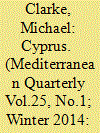

|
|
|
|
|
| Publication |
2014.
|
| Summary/Abstract |
The eastern Mediterranean, and particularly Cyprus, had been set for some sort of international crisis throughout 2013. Many tense situations become spring loaded by their circumstances, and no one can predict what, if anything, might set them off. But in the politics of the eastern Mediterranean, there are so many hefty mice at large that it is increasingly likely that at least one of the them will run across the pressure plate, probably sooner rather than later. The fact is that Cyprus finds itself caught in the shockwaves of a number of upheavals in the Middle East and in Europe and in the increasingly fraught politics of the eastern Mediterranean itself-and at a time when the Cypriot government is least able to operate independently and navigate its own diplomacy in its own national interests.
|
|
|
|
|
|
|
|
|
|
|
|
|
|
|
|
| 5 |
ID:
133047
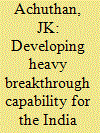

|
|
|
|
|
| Publication |
2014.
|
| Summary/Abstract |
A 'heavy breakthrough capability' in India's context relates to having the capability to reach objectives up to 100km in depth, should the political circumstances impose war on our nation.
Our democratic set up will never allow India to become the aggressor, as the people's support will never be available for even thinking at such dangerous and unproductive ventures. India
does not believe in either territorial conquest or torcible amalgamation ot unwilling or a dillerent
type of population. Such actions can only be carried out by totalitarian regimes which can easily misrepresent tacts to their countrymen and live a lie while festering rebellions gather smoke waiting tor the central authority's power to wane. It was exactly such a situation that arose in the erstwhile Soviet Union leading to its break up.
|
|
|
|
|
|
|
|
|
|
|
|
|
|
|
|
| 6 |
ID:
128742
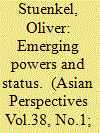

|
|
|
|
|
| Publication |
2014.
|
| Summary/Abstract |
Why did the leaders of four very different countries-Brazil, Russia, India, and China-decide to hold a summit in 2009 in Yekaterinburg, thus transforming "the BRICs" from a financial category into a political grouping? I argue that the main driver for the first summit to take place and succeed was to strengthen each member country's international status. The 2009 BRICs summit was successful in that it led to the birth of a political platform during highly unusual international economic and political circumstances. In a global economy in the midst of a recession and widespread uncertainty, the BRICs' relative economic stability and capacity to respond to the crisis was decisive and lent credibility to their call for reform of the international system. The United States' temporarily reduced legitimacy also provided a window of opportunity for emerging powers to act as aspiring guarantors of stability in tomorrow's world. While measureable gains from cooperation and stronger rhetoric that delegitimized the global order did occur in the following years, they were not the primary drivers for the first summit to take place and succeed.
|
|
|
|
|
|
|
|
|
|
|
|
|
|
|
|
| 7 |
ID:
134151


|
|
|
|
|
| Publication |
2014.
|
| Summary/Abstract |
Allowing or restricting foreign movement is a crucial policy choice for leaders. We argue that freedom of foreign movement reduces the level of civil unrest under non-democratic regimes, but only in some circumstances. Our argument relies on the trade-offs inherent in exit and voice as distinct strategies for dealing with a corrupt and oppressive state. By permitting exit and thereby lowering its relative costs, authoritarians can make protest and other modes of expressing dissatisfaction less attractive for potential troublemakers. Liberalizing foreign movement can thus function as a safety valve for releasing domestic pressure. But the degree to which allowing emigration is an effective regime strategy is shaped by the economic opportunities offered by countries receiving immigrants. We find that freedom of foreign movement and the existence of economic opportunities abroad reduce civil unrest in non-democratic states. However, at high levels of unemployment in the developed world, greater freedom of foreign movement actually increases protest.
|
|
|
|
|
|
|
|
|
|
|
|
|
|
|
|
| 8 |
ID:
131456


|
|
|
|
|
| Publication |
2014.
|
| Summary/Abstract |
This study focuses on the poetry of the well-known Kurdish poet Cegerxwîn (1903-84). Contextualizing Cegerxwîn's life and literary career within his specific social, political and historical circumstances, this article demonstrates the way in which Kurdish classical poetry during his madrasa education shaped Cegerxwîn's poetic creation. Furthermore, the oppression and exploitation of Kurdish peasants at the hands of tribal chiefs, sheikhs and nation-states contributed to Cegerxwîn's adoption of a Marxist and nationalist social and political standpoint. This article, attempting a closer reading of his poetry, suggests that at the essence of his poetry is found the continued use of the metaphor of awakening. Hence Cegerxwîn's poetics and politics can best be depicted as one of awakening the oppressed and subordinate social groups including the Kurds, peasants and workers from their deep sleep of oppression and exploitation. Through his Kurdish poetics and politics of awakening, it is argued, Cegerxwîn participates in the progressive political discourses of his times.
|
|
|
|
|
|
|
|
|
|
|
|
|
|
|
|
| 9 |
ID:
129264
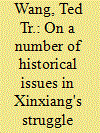

|
|
|
|
|
| Publication |
2012.
|
| Summary/Abstract |
This is part of a supplementary address by Comrade Jiang Zemin at the Central Committee's Taiwan work meeting. For some time already, ethnic separatists in China's Xinjiang and outside its borders have been rampantly active and have brought serious harm to Xinjiang' stability and development. We must be highly alert and take strict precautions. Our leading cadres and especially high-placed cadres must inform themselves about both the historical and current circumstances of the so-called East Turkistan issue touted by Xinjiang's ethnic separatist forces. The Xinjiang region has since ancient times maintained close contacts with the motherland's Central Plains. From the Han dynasty up to the mid and late Qing dynasty, Xinjiang and its surrounding regions came under the general designation "western regions." In the second Shenjue year of Han Emperor Xuandi, or 60 by the Gregorian calendar, the western regions were officially incorporated into the motherland's territory. During the Sui and Tang dynasties, the central government continued to exercise administration over the western regions, and Tang Emperor Taizong substantially strengthened its jurisdiction over that vast region.
|
|
|
|
|
|
|
|
|
|
|
|
|
|
|
|
| 10 |
ID:
125303
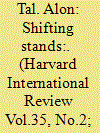

|
|
|
|
|
| Publication |
2013.
|
| Summary/Abstract |
While the Middle East is frequently in the news because of political volatility and violence, there is an underlying lack of environmental equilibrium that poses a comparable threat to regional stability. Israel's neighbors--Egypt, Jordan, and Palestine--are arid countries with limited natural carrying capacity and burgeoning populations. Providing food and employment in what were traditionally agrarian economies has contributed to significant depletion of soil and water resources. Israel's experience as an innovator in technologically intensive dryland agriculture and forestry is entirely different. Yet it is not clear whether the grand Israeli experiment in water management and combating of desertification offers a compelling alternative model to its neighbors should diplomatic breakthroughs pave the way for transboundary cooperation. Not only are the socioeconomic and cultural circumstances entirely different, but the sustainability of some of Israel's unique management practices remains questionable.
|
|
|
|
|
|
|
|
|
|
|
|
|
|
|
|
|
|
|
|
|